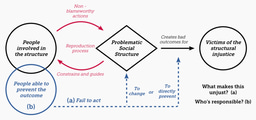Research Proposal - Can an ‘interactional’ account of philosophical human rights be a tool for attributing responsibility for global structural injustice?
Summary of research:
Part of the job of human rights theorists in political philosophy is to decide which harms against individuals should count as human rights violations (HRVs). ‘Structural injustices’ are harms which we have reason to call unjust, but which are caused by complex social structures such that it is difficult or impossible to consider any one individual responsible for them. This research intends to investigate whether it is conceptually coherent to describe some of these structural injustices as HRVs.
This project works within one specific theoretical understanding of human rights – the ‘interactional’ account. On this account, each right is held by one individual, against another individual (i.e. the other individual has a duty to respect that right). The tension between this account and the concept of structural injustice is that when the interactional account is being used to name HRVs, it relies on identifying responsible individuals. The hypothesis I will test is that there are at least some types of structural injustice in which these harms can be considered HRVs (on the interactional account).
The motivation for this research is primarily to demonstrate to structural injustice theorists that interactional human rights can be taken seriously as a way of attributing moral responsibility for structural injustices.



Please sign in
If you are a registered user on Laidlaw Scholars Network, please sign in